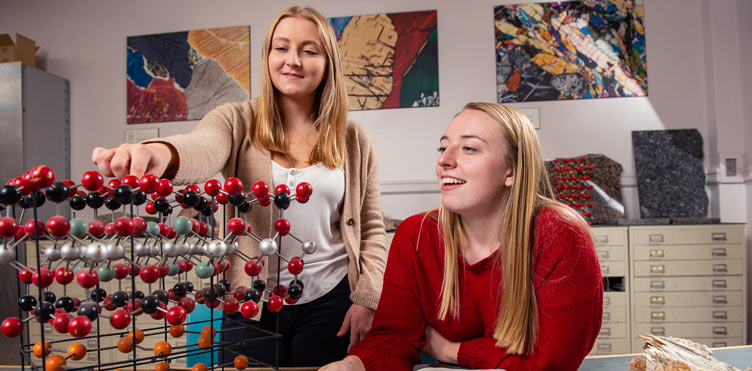Undergraduate programs

Earth Sciences are the natural sciences that deal with our planet’s composition, resources, and environment, its surficial features, and the formative and destructive processes that continue to shape it and the life it sustains.
Learn all of this and more in UNB’s earth science-related undergraduate programs, all of which include opportunities for field-based learning in our geologically diverse province and around the world.
Program options
Earth Sciences
Earth sciences deal with the Earth: its interior make-up and surficial features (e.g., oceans, continents, glaciers, lakes), its formative and destructive processes, its age, and its history.
Earth scientists research natural hazards, such as landslides, earthquakes, floods and volcanic eruptions. They investigate groundwater, river and coastal erosion or flooding, sea- and lake-level rise and fall, and climate change. They discover and aid the environmentally responsible development of metallic minerals, salts, clay, sand, gravel and petroleum resources. Urban and land-use planning, and efforts to clean up our environment, require a sound knowledge of earth-science processes.
Possible career paths
- resource exploration and development industries
- energy (including renewables & storage) industries
- site assessment & remediation
- engineering, legal, and environmental organizations
- government, education, and academia
To manage and sign-off on geoscience work for the above careers, students should take a program option that allows for professional registration after graduation.
Learn more
Environmental Geosciences
The environmental geosciences provide students who have both earth science and either environmental or interdisciplinary interests with a background to pursue careers or graduate studies in environmentally related geoscience fields.
Students with interdisciplinary interests in earth sciences and chemistry can examine the chemistry of everything from surface and ground waters to magmas and rocks, and address environmental concerns relating to the extraction of mineral and energy resources.
Students with interests in earth sciences and biology can explore interactions between the biosphere and the environment; history and evolution of life on Earth; and use fossil tracers to reconstruct geological, environmental and climatic events.
Possible career paths in environmental geosciences
- resources and energy (including renewables & storage)
- environmental impact assessment and site remediation
- surface water and groundwater supply development
- waste treatment
- oceanography, environmental geophysics
Learn more
Environmental Sciences
The new Bachelor of Science in Environmental Science degree program provides students with a theoretical and experiential grounding in scientific principles pertaining to the earth’s environmental system.
As the program progresses, students advance to consider environmental issues from broader ethical, economic and social viewpoints while developing their own scientific interests with a more specific collection of required and elective courses.
These advanced science courses are tailored for students to graduate with a concentration in one of six areas:
- Biological responses to the environment (biology focus)
- Chemical environmental perspectives (chemistry focus)
- Environmetrics (mathematics & statistics focus)
- Responsible resource recovery (Earth sciences focus)
- Sun-Earth interaction (physics focus)
- Water-Earth interaction (Earth sciences focus)
Possible career paths in the environmental sciences
- government and education
- conservation and non-profits
- meteorology and climatology
- water and waste treatment
- site mitigation and remediation
Learn more
Geological Engineering
Geological Engineers explore, protect, and responsibly develop the Earth’s water, mineral, and energy resources. They also ensure that engineering structures are designed for long-term stability and safety, taking geological conditions and hazards into account.
Geological Engineering at UNB is a four-year Bachelor of Science in Engineering Program.
Possible career paths
- Engineer
- Geoscientific and environmental consulting
- Project leaders for the exploration of minerals, energy, and groundwater resources
- Environmental protection
- Government and regulatory agencies
Learn more
Geological Studies
This program is designed for those students who are looking for some specialization in earth sciences or environmental geosciences, but who upon graduation are not planning for professional registration and a geoscience career in industry or government.
Possible career paths
- geotourism and museum curatorship
- conservation and non-profits
- education
- journalism
Learn more
Have a hands-on career
Careers in earth sciences offer opportunities for field and office work in many areas of the world with employment in environmental monitoring and remediation sectors, the mineral industry, including exploration for oil, metals, and industrial minerals, in government surveys, in university teaching and research, and as independent consultants to the mining industry and engineering and environmental organizations.
Geologists also offer their expertise in corporations and legal firms.
